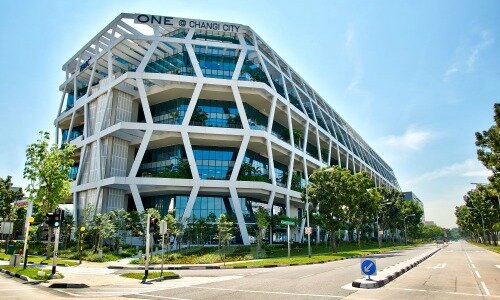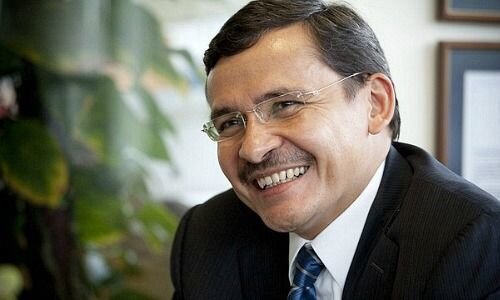Benjamin Cavalli: «I'm Only in Virtual Contact With My Boss Now»
Asia has a different approach to crises than other regions as people are experienced in dealing with such events, says Benjamin Cavalli, CEO Singapore and head of private banking in South Asia, in an exclusive interview with finews.asia.
The coronavirus is a burden on many industries including the financial sector. It became evident by the massive slump in bank share prices, but also by the fact that many employees have to accept some drastic changes to their working days.
Some employees have to stay at home in quarantine for two weeks after traveling abroad, while others have been divided into groups under business contingency plans (BCP) and work on a rotating basis either from other locations or from home.
One of the Most Important Foreign Banks in Asia
As an international financial center, Singapore has been impacted by the virus, with more than 100 confirmed cases. However, the Southeast Asian city-state is probably doing most to prevent a further spread. In many companies, the temperature of staff is taken several times a day, while visitors must undergo the same procedure and also fill out a form for meetings.
They have to confirm that they themselves have not been to China in the past 14 days nor that they have family members who traveled to China (the latest guidelines for Singapore).
Credit Suisse (CS), which is one of the most important foreign banks in Asia, was one of the first financial institutions in Singapore to activate its BCP (for front to back operations) as early as the beginning of February 2020, as Benjamin Cavalli, CEO Singapore and head of private banking in South Asia, explained in an exclusive interview with finews.asia. Credit Suisse has taken a pioneering role.
Benjamin Cavalli, what was the trigger for the activation of your contingency plan?
Basically, it's about ensuring that the company can continue its business activities to serve clients in full even in an emergency. Looking ahead, the timing at the beginning of February, when the first suspected cases arose, was absolutely right for us in Singapore.
What are some of the health measures you have in place at Credit Suisse in Singapore?
We asked our employees to stay at home and contact a doctor if they are unwell and our employees did that. Twice a day, we take the temperature of all employees. For the time being, only essential travel is allowed, subject to approval from the very top.
What does your BCP actually look like?

The core of the plan is to have split operations for our staff in Singapore between our two premises One Raffles Link, ONE@Changi City (pictured above) as well as working from home. It was important to ensure all employees have access to the IT tools needed to communicate, advise, trade and complete other administrative tasks from anywhere.
«Everyone moved in tandem»
In addition, the team-oriented approach had to be maintained. [Ultimately, we are fully committed to providing seamless service and support to our clients during this challenging time].
How did it work?
Amazingly well and absolutely smoothly. One advantage was certainly the fact that we already have co-working offices with smart working arrangements in our Changi office, so we were able to convert to this concept relatively quickly. Everyone moved in tandem. Just one week after the activation, the first group was already at their new place of work.
Where are you working now?

I also moved to our Changi office about ten days ago together with some team members. The fact that for the time being, I'm in virtual contact only with my boss, Asia CEO Helman Sitohang (pictured above), takes getting used to it.
How do employees react to the changes?
Very calmly. Asia has a different approach to crises than other regions as people are experienced in dealing with such events.
«Every crisis also contains opportunities is a credo that prevails here»
Many remember earlier situations, such as the SARS epidemic in 2003 – and every crisis also contains opportunities is a credo that prevails here.
What is the most important thing now?
Timely and transparent communication is essential. Internal communication, in that I speak with my staff on a daily basis by call and that the crisis committee also exchanges information on a daily basis. As for external communication, it is also especially important as many clients now have more time because they do not travel as often for business.
How do you respond to this?
Since many major conferences, such as our Asian Investment Conference (AIC) was canceled, and our Philanthropist Forum or the Supertrends Conference, have been postponed, we are increasingly communicating with our clients via video call and other virtual tools. We continue to offer them important first-hand market assessments and analysis from experts.
«The crisis is further accelerating digitization»
Since the outbreak of the crisis, more than 30 percent of our clients have activated or updated their digital communication tools such as CS Chat and CS Digital Private Bank with us. In other words, the crisis is further accelerating digitization in the financial world.
Benjamin Cavalli, 47, was appointed to the role of Head of Private Banking South Asia in August 2018, based in Singapore. In addition, he took on the role of Singapore Chief Executive Officer from January 2017. He joined Credit Suisse in November 2009 from UBS Wealth Management, where he was the Head of Key Clients Singapore. He started his career in the Export Finance department at UBS in Switzerland in 1992 and headed the Commodities, Structured Trade and Export Finance at UBS Investment Bank in Hong Kong from 1997 to 2000, before beginning his career in wealth management. He is accredited under Financial Industry Certified Professionals (FICP) by the Institute of Banking and Finance (IBF) in Singapore.























